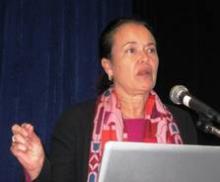SAN ANTONIO – It’s back!
At a median follow-up of 8 years in the landmark HERA trial, patients randomized to 1 year of trastuzumab (Herceptin) once again displayed a significantly greater overall survival rate than did a control group assigned to observation, Dr. Martine J. Piccart reported at the annual San Antonio Breast Cancer Symposium.
This updated analysis is cause for celebration. At 2 years of follow-up, HERA (HERceptin Adjuvant) participants who’d received a year of trastuzumab had a 34% reduction in risk of all-cause mortality compared with controls (P = .0115). This survival advantage had vanished at 4 years, however. An intention-to-treat analysis at a median 4 years of follow-up (Lancet Oncology 2011;12:236-44) showed 89.3% survival in the trastuzumab group and 87.7% in controls, a nonsignificant difference (P = .1).
"As you can imagine, there was some concern in 2008 because it looked like the survival benefit had disappeared. So it’s very good news that now, with a very mature follow-up, we see a robust reduction in the risk of death with 1 year of trastuzumab given sequentially after chemotherapy and/or radiotherapy," declared Dr. Piccart, chief of the department of medicine at the Jules Bordet Institute in Brussels and president of the European Society for Medical Oncology.
New data show 24% reduction in relative risk
Indeed, at 8 years follow-up, a cumulative 278 deaths had occurred in the trastuzumab group compared with 350 in controls, for an adjusted 24% relative risk reduction (P = .0005).
The same pattern was seen for disease-free survival: a decrease in the benefit of 1 year of trastuzumab between years 2 and 4 of follow-up, with the relative risk reduction sliding somewhat ominously from 36% to 24%, albeit still significantly significant. Gratifyingly, however, the new 8-year analysis showed no further erosion in the disease-free survival benefit. It remained steady at a 24% relative risk reduction, with 471 events in the trastuzumab group and 570 in controls (P less than .0001).
The explanation for the dicey findings at a median 4-year follow-up is twofold: The results were less stable than at 8 years because considerably fewer events had occurred at that point; plus, fully 52% of women in the observation group elected to start taking trastuzumab once they received the opportunity following the 2005 initial report of favorable early benefits. Thus, the HERA intention-to-treat analyses underestimate by a considerable margin the true benefits of 1 year of trastuzumab because more than half of the patients listed as being in the control arm have actually taken the drug, Dr. Piccart noted.
At 8 years of follow-up, the disease-free survival benefit favoring 1 year of trastuzumab over observation was significant whether patients had hormone receptor–positive or negative tumors.
HERA is an international, multicenter, phase III randomized trial involving 5,102 women with HER2-positive early-stage breast cancer. They were randomly assigned to 1 year of trastuzumab, 2 years of the drug, or to observation following adjuvant chemotherapy and/or radiotherapy.
One year trumps 2 years of adjuvant trastuzumab
HERA is the only randomized trial investigating whether 2 years of trastuzumab is better than 1. And as Dr. Piccart declared in San Antonio, the answer is no. Longer therapy brought no advantage in terms of disease-free or overall survival, and it was associated with a significantly greater incidence of asymptomatic left ventricular dysfunction: 7.2% compared with 4.1% in women who received 1 year of trastuzumab. Fortunately, most of these cardiac abnormalities were reversible upon discontinuation of the drug, she observed.
"HERA confirms that 1 year of adjuvant trastuzumab should remain the standard of care in women with HER2-positive breast cancer," Dr. Piccart said.
"I think the HERA trial is an extremely important one," said conference codirector Dr. C. Kent Osborne.
"The reason is, you can imagine the cost to the health care system if we have to give trastuzumab for 2 years rather than 1. So I was really gratified to see that 1 year seemed just as good. Although the drug is not terribly toxic to people, still, the practicality of it and the expense of it are a problem.
"So I think HERA sets the standard at 1 year going forward with future studies," said Dr. Osborne, director of the Dan L. Duncan Cancer Center and the Lester and Sue Smith Breast Center at Baylor College of Medicine, Houston.
The HERA trial is being conducted by the Breast International Group (BIG) with funding from Roche. Dr. Piccart, who chairs BIG, is a consultant to the pharmaceutical company.


